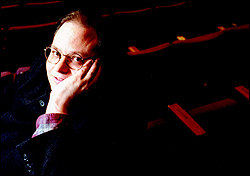Perhaps the most surprising quality about Take Me Out (opening Wednesday, Nov. 10, at the Seattle Repertory Theatre, 206-443-2222) is how, well, surprising it is. When you hear that someone has written a play about a baseball hero coming out of the closet, you tend to think you know what characters will come trotting onto the diamond: the homophobic teammates, the well- meaning friends, the disgruntled fans, etc. And, yes, they’re all there. But the play dares you to assume you know how you feel about any of them—or about anything, for that matter.
No one was more astonished than Richard Greenberg that he wrote the playto begin with. The witty, garrulous gay New Yorker is good at surpassing genre expectations—his Eastern Standard, which premiered at the Seattle Rep in 1988, far outstripped the then-popular comedies about yuppie angst—but he’s the first to say that baseball was never a first love. So, then, why?
“Baseball came as such an incredible and unnecessary surprise,” he says in a phone interview. “I wasn’t looking for something. That’s the thing that makes it most surprising—aside from the fact that I’d be interested in a sport. It happened accidentally one day in July of 1999. I was flipping through the channels and saw a Yankee game and decided that I wanted to put in my time as a regular-season fan if they were gonna be in the World Series again—because I knew intuitively there was something bogus about just coming in for the last seven games and pretending you’d been suffering all season long. And within a couple of weeks, I was lost to it. There was nothing left in life.”
Take Me Out transposes that joy onto a national canvas. Darren Lemming is the closeted, biracial, star center fielder for the fictional New York Empires, who decides, hell, why not tell fans that “any young man, creed, whatever, can go out there and become a ballplayer. Or an interior decorator.” Once “out,” Lemming finds his revelation subtly changing the behavior of even those who don’t give a damn—like friend and teammate Kippy Sunderson—and causing a tumult of events when Shane Mungitt, the Empires’ dim new pitcher, rather innocently unleashes a torrent of hate speech on national television. The result is no movie-of-the-week rainbow-flag treatise—it’s as honest and funny a depiction of what it feels like to live in an embattled, emboldened United States as any more earnestly political play. And yes, baseball fans, Greenberg took a lot of cues from real-life people and events— including ex-Mariners and current Yankees first baseman John Olerud, the inspiration for the erudite Kippy.
“[Olerud] looks like this classic New England schoolmaster, and I thought that set up such a wonderful contradiction, to think of him as this essentially cerebral guy,” he explains. “So I started embroidering it.”
The embroidering continued in 1999 as Greenberg followed the news of ex–San Diego Padres outfielder Billy Bean, who came out after his career ended, and John Rocker, the then–Atlanta Braves relief pitcher who managed to offend Mets fans, gays, New Yorkers, Asians, Koreans, and nearly everyone else during a blistering conversation with Sports Illustrated.
“Billy Bean came out, and he said that he thought the only way someone could stay in the game and come out was if he were an already established superstar,” Greenberg remembers. “So I thought, ‘All right, that’s what I’ll write about.’ Because I was aware that I couldn’t write this play as if I were [Bull Durham writer-director and former ballplayer] Ron Shelton—I had to have my own sort of ingress on the material. And then after John Rocker gave that hideous interview, I thought, ‘Well, this is a good model for an antagonist.’ And suddenly with my protagonist and my antagonist, I had a force field and a play just happened.”
Greenberg says “protagonist” and “antagonist,” but the great success of his play lies in his talent for blurring the distinctions between the two, for getting us to surprise ourselves by shifting our loyalties in the same unexpected way the characters do.
“Kippy says he falls ‘hopelessly in custody of [Shane],'” notes Greenberg, contemplating the protective impulse that Sunderson develops toward the bigoted pitcher. “And I think we have to as well.”
He laughs at the irony.
“It’s so hard to sustain an ironclad opinion about anything,” he muses, unintentionally summing up the play itself. “There’s always so much information.”








